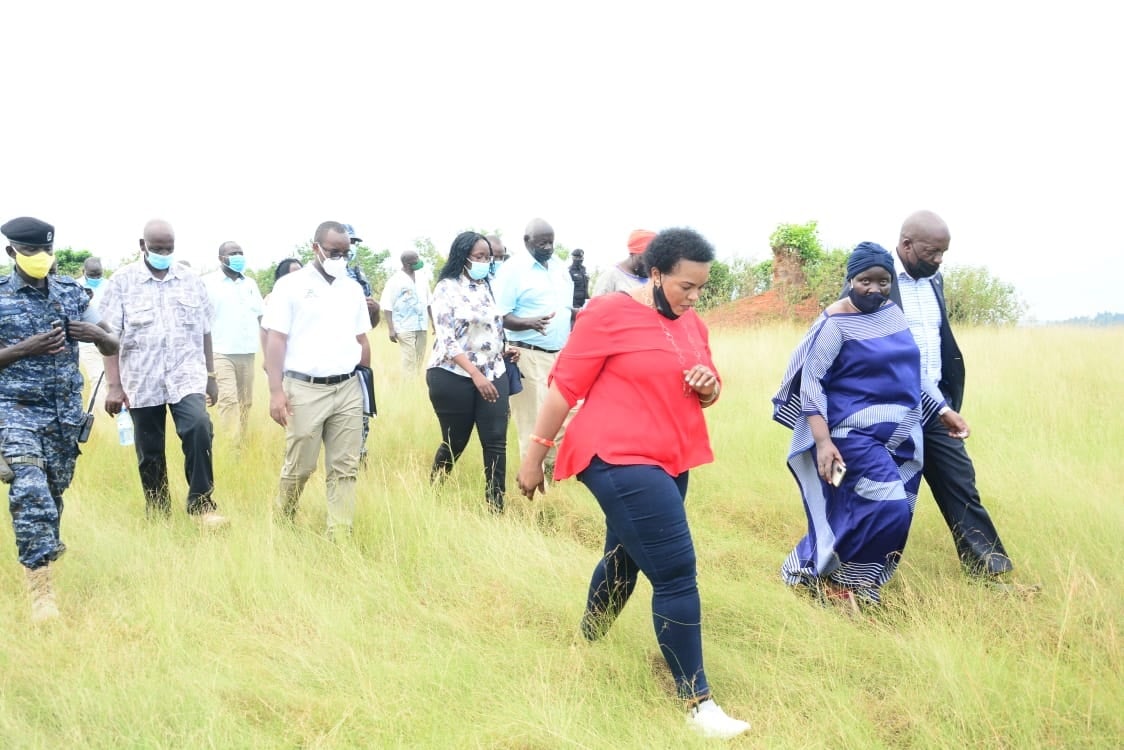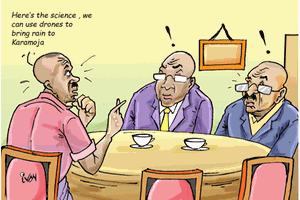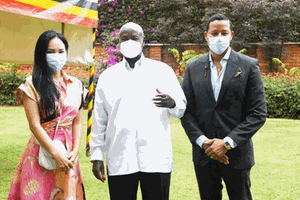
Lands Minister Judith Nabakooba (5th right), State Minister for Lands Persis Namuganza (in red), and officials of the Uganda Land Commission during a tour of the site for the proposed Akon City in Mpunge Sub-county, Mukono District, in January 2022. PHOTOS | JESSICA SABANO
The sun toe-pokes the green landscape as a new horizon opens up in the deeper recesses of Mpungwe sub-county nestled against the blue waters of Lake Victoria in Mukono District. It is a picturesque expanse with immense tourism potential, which is yet to be harnessed.
A vast undulating terrain is sparsely populated, dotted with farmlands and forest vegetation. Along the spread-out shoreline, hundreds of communities have for decades eked a living from fishing and farming.
That tranquillity faded on January 7, 2022, when Lands Minister Judith Nabakooba, accompanied by her junior Ms Persis Namuganza, and a coterie of Uganda Lands Commission (ULC) officials, first visited the area to survey land for parcelling to the Senegalese-American singer-record producer, Aliaune Damala Bouga, better known by his stage name Akon, to construct a “futuristic” city powered by a cryptocurrency called “Akoin.”
“When you look at the view; the lake, the mountains, the mini-city will attract a lot of Ugandans to this place. The buildings I saw in the Akon City architectural plan, if followed to the dot, will raise the standards of Uganda to have one of the biggest cities in the world,” Ms Namuganza remarked.
Since then, more than 10,000 residents spread across eight villages of Muvo, Kiziru, Lulagwe, Kyazi, Mbazzi, Lubebi, Sango and Kamwanyi have been living in fear of eviction to pave the way for the redevelopment. Across villages, there are schools, ancestral homes and lands, and several residents say they have lived there for decades. Several residents living on the land have titles for the land and the government says it is moving forward with plans to cancel them.
ULC maintains that the government owns a square mile of land across the Mpungwe recesses. Of this, 300 acres are for allocation for the Akon City and the rest is for the proposed smart Kojja peninsula tourism city, which could as well be elevated to plan for a new capital city.
For various reasons, including environmental challenges, countries around the world are building new cities, including capitals, and discarding old ones, to especially ease population pressure or service delivery. Some countries have been building from scratch, better planned and well-organised settlements.
Closer home Egypt has since 2015 been constructing another city as a new centre for its government, about 40 kilometres from Cairo. Tanzania moved its capital from Dar es Salaam, which remained a commercial hub, to Dodoma.
Elsewhere, the likes of Malaysia, South Korea, China, Saudi Arabia, and neighbouring Kenya, long battered by the effects of climate change, are enthusiastically mulling smart cities—purpose-built— combing a mix of technology and conservation, as the hubs of tomorrow’s trade, finance, logistics, and long-term economic growth.
Back in Mpungwe, tensions flared early last month, across several villages mapped for redevelopment, after a team of surveyors from ULC turned up to start demarcating land.
Attempts by the surveyors’ leader Arthur Akanga to calm the residents that they were not visiting to evict anyone fell on deaf ears.
“Our presence is not to evict anyone, we have orders from the bosses to locate free land such that the government uses it and leaves the rest to locals,” Mr Akanga said.
The July 11 border reopening exercise had been communicated earlier on June 20 but residents could not hear any of it. The sub-county chairperson, Ms Fridah Namyalo Muwanga, accused ULC and Ministry of Lands officials of callousness in dealing with the matter.
“Two years ago, I was at my home and saw more than 30 vehicles driving through at speed. So I decided to follow along with one of the residents. These vehicles stopped at a hill in Mbazzi Village and I saw the ministers, RDC and other officials,” she said.
“To my surprise, one of the officials, who had moved with them, knew me and informed them that I was the LC3 chairperson, so they gave me a microphone to help them address the residents but I refused because I didn’t know what to speak about and was not aware of their intentions there,” she added.
According to Ms Namyalo, the officials said they were giving land for Akon City and promised that in six months there would be a city with improved roads, electricity, a university, a hospital and good schools.
She added: “Then in June I received a letter from ULC, saying their surveyors would be coming on July 11 for the border reopening. I was shocked because we have never been consulted as leaders and residents. I decided to inform the people I lead and we marched to the RDC’s office at the district headquarters.”
She said the RDC warned them never to obstruct the landlord’s development.
“We came out of the office not satisfied asking ourselves who the landlord is when it’s public land and we decided to wait for the surveyors. We mobilised ourselves and we blocked them from conducting any activities on the land until we understood everything,” Ms Namyalo said.
Several residents wondered how the government puts the interest of a foreign musician over its citizens.

A team of the surveyors who were blocked by residents from opening the boundaries of the land in Mukono District on June 11.
“Why is the government mistreating us, can’t Akon develop his home country?” wondered Ms Josephine Nakasanje, a resident of Mbazzi Village, one of the eight that fall within the area proposed for Akon City.
“Before they evict us, they need to first give us land elsewhere. Everyone is crying over land; those who bought plots in swamps are being evicted, others are given money and they fail to get land where to go. For some of us, we have known this land our entire lives,” she said.
Mr Matovu Kamya, the LCI chairperson of Kaziru, explained that he has more than 300 Bibanja title holders in his village and wondered what is hard with ULC and the Ministry of Lands engaging with local authorities.
“They should stop acting like they are too special not to have meetings or discussions with residents on such issues. They should be considerate and fix themselves in the same shoes like they were the ones they wanted to evict in an improper way what would they do or how would they feel,” he said.
“I’m a leader but haven’t seen any one coming to talk to us about this issue, not even the RDC and yet I hear she moves with them whenever they visit,” he added.
Mr George Nsamba, a fisherman at Kaziru Landing Site, said it has become a government tendency to push impoverished communities to the edges.
“Unless they want us to become criminals. We are surviving here and if you forcefully push us away, you will see the outcome. We are already fed up, they sent us off the lake and handed it to the UPDF, we just struggle to find a way of surviving so that we can care for our families and again they are adding another pain to us,” Mr Nsamba noted.
Muzamiru Kibirango, the chairperson of Muyo Village, wondered why the President does not find vacant land in western Uganda, which is equally known for natural idyllic beauty.
“Let the President/government allocate Akon land in western Uganda. There is a lot of vacant land in Mbarara, Ntungamo and other districts,” Mr Kibirango told this newspaper.
Mbazzi village hosts different sites, which are of great cultural significance, including the seat (obutaka) of the Nvubu (Buffalo) clan over an expanse covering 50 acres. In Buganda Kingdom, a clan represents a group of people who can trace their lineage to a common ancestor.
The caretaker of the site, Mr Abdul Matake, wondered how and where they are expected to relocate thousands of forefathers buried there.
“There is nowhere we can transfer the dead, they are so many and therefore not ready to be evicted, even if they compensate us there is no place we can put all that belongs to this clan,” Mr Matake said.
Tangled plans
Mpungwe Sub-county lies within the proposed Kojja peninsula tourism city, which starts from Nakitokota forest and Kikuta Village in Katosi Town Council where the swamps from both sides of the lake come close to a meeting point at Kikuta.
Several proposed mega infrastructure projects cut through the area, notably, the Standard Gauge Railway (SGR) line from Malaba in eastern Uganda to Kampala, and the $1.2b (Shs4.4trillion) Kampala-Jinja expressway.
The National Water and Sewerage Corporation has a supply line cutting through at Katosi. And from the Lake Victoria shores nearby, it is a few minutes travel by boat to Luzira and Ggaba, among other places.
“We looked at the area over and again, and we thought this area could be developed into something. We are not saying this should be the capital city but what we are saying is this island needs to be built into a planned city,” argued Prof Jack Nyeko Pen-Mogi, the former ULC chairperson.
ULC is the statutory body that holds in trust and manages any land owned by the government.
Akon, who has visited Uganda twice, first pitched the idea of the imprecise investment to President Museveni during his first visit in 2021.
Asked during a press conference at the Office of the Prime Minister (OPM) why he chose Uganda, Akon, who was flanked by the State Minister for International Affairs Henry Oryem and ICT minister Dr Chris Baryomunsi, cited the country’s potential.
“For me, my choice is based on potential. When I look at the potential of all the places in Africa from a touristic standpoint, I believe Uganda has one of the biggest potentials. I believe Senegal has one of the biggest potentials. I believe Ghana has one of the biggest potentials… Ethiopia has one of the biggest potentials,” he said.
“Certain countries have very huge potential and it’s less threatening in many ways and when you look at it from that standpoint, it makes it easy to decide because once there is potential it’s easy to grow something that is viable,” he added.

Part of the land earmarked by the government for the proposed Akon City.
“Just from my visit here there is so much about Uganda that I never knew even existed. It’s a certain welcome that I never knew even Uganda had. When you look at how Uganda has been promoted internationally you’d be scared to death to come to Uganda all they tell you is the time of Idi Amin.”
The Akon City in Uganda, similar to one he pitched in his home country in West Africa seven years ago but has never taken off, is expected to be complete by 2036. The Akon City in Senegal was estimated to cost $6b and expected to open in 2026, but according to several online accounts, it has never taken off.
Prof Pen-Mogi and Ministry of Lands officials said they were “merely” implementing a presidential directive for the project.
“For us as ULC, we saw that the government should look beyond the Akon City but rather plan a well-planned city. We have discussed this with the National Planning Authority and the senior leadership in the Ministry of Lands to gazette this land. How far the plans go is not mine to say,” Prof Pen-Mogi, who bowed out of office last Wednesday following the expiry of his five-year term, said in an interview.
He added: “There is a lot of land around there but we are not claiming anything outside the one square mile. The rest of the land, whether 20 square miles, can be acquired for this purpose. It is also true that there are residents living there, especially on the shores but they can be compensated and the government plans the entire land for a new city.”
Documents seen by Daily Monitor detail that following President Museveni’s first engagement with Akon in April 2021, the ministries of Finance, Lands, and Agriculture, and the State House Comptroller, Ms Jane Barekye, were tasked to scout for the land through the ULC. The land was first surveyed and secured in 2022.
The part of the land overlooking the Lake Victoria blue waters, according to ULC, was once occupied by Bob Astles, the British factotum to Idi Amin.
Calculated land grab?
Mukono District chairperson Peter Bakaluba Mukasa accused ULC of sidelining them and directly working with the Resident District Commissioner on “wrongfully giving out” of the land without following due procedures.
“We are highly concerned about how this whole thing was arranged. The land belongs to Mukono District Land Board but we were never consulted at all. Mind you there are more than 10,000 people occupying part of the land; some bonafide owners, bibanja owners, freehold, and leaseholders. Procedurally, they should have first inquired from us, whether in writing or verbally, whether the land is vacant,” said Rev Mukasa.
He added: “It is unfortunate during our time to experience the kind of act that is intended to chase away people, there are mothers, children, schools, sites for cultural significance, worshipping centres and others. They (ULC) keep coming here and we just keep hearing in corridors that they went over to survey the land, threatening to evict the residents, and all but no one in the district is in the know.”
“We condemn all the arrangements that have been done in terms of transparency and decentralisation. This process had to first come to us to ascertain how our people are to be helped if the land is badly needed,” he noted.
Growing trend
Catalysts
The Akon City fiasco bears parallels with the giveaway of 82.05 acres of prime land, part of the former Nakawa-Naguru estates, to establish a satellite city.
The investors for the mega satellite city were window-shopped in the first place.
According to designs presented to President Museveni, the city would include recreational facilities, places of worship, Nakawa Division headquarters, a five-star hotel, a referral hospital, an international school, a proposed shopping mall, and low to high-level condominiums.
The investors, the Comer Group owned by billionaire brothers Luke and Brian Comer in partnership with a hitherto unknown local company OpecPrime Properties, had been given land measuring 166 acres in 2005 with the approval of Cabinet.
The Comer Brothers walked away in 2017 citing the messy local politics and marginal economic prospects because Ugandans are too poor to afford the proposed luxury homes.
Luke Comer, one of the billionaire brothers, told Irish newspaper The Business Post that: “The main problem was the difficulty local people had in obtaining mortgages. Who’s going to give them mortgages? Africa is not a great prospect in that way.”
Mr Comer revealed that the would-be project financers, the Dutch-based Netherlands Development Finance Company, were discouraged by the way Ugandan authorities handled the eviction of about 1,714 former tenants who had been boxed into signing a memorandum of understanding detailing that they would be given priority to occupy the first 1,000 units of the flats/apartments once erected.
The ground-breaking construction of the satellite city happened in 2014 before the project stalled. No sooner had the Comer Brothers walked away in 2017 than the land was redistributed.




